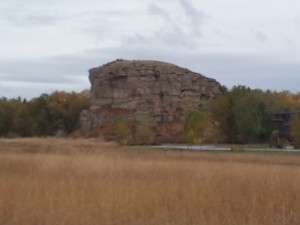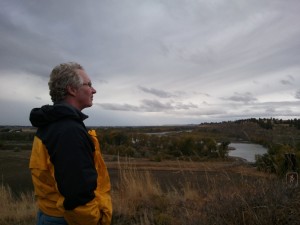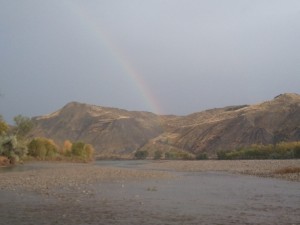For audio version click here: pompeyspillar50
A day and a half before we flew home, in a restaurant a few feet away from the river bank that dropped down to the Yellowstone in Gardiner, six of us sat at the table drinking beer and eating beef, telling stories and laughing — a couple from Maine who had backpacked in Iran and Iraq and ridden on horseback on wooden saddles across Afghanistan in the 70’s, an Air Force MP lifer, newly retired, who had recently returned from 8 months examining vehicles for weapons and explosives outside a base in Afghanistan and was now trying to begin her life again, and the Vietnam vet who had given up selling RV’s in Florida and was preparing to spend his first winter in the Park as manager of several stores. All fifteen days out west had been like this, an exultant tilting back and forth from solitude to companionship. Everywhere we traveled, 1400 miles across a good portion of both Wyoming and Montana, we met gracious, open people.
Among them — the North Dakota transplant, Marian, one of twelve children, granddaughter of sod-busters who rode one of the emigrant trains to the west. They had rented one boxcar for their family and into it poured all their possessions, including a horse and a plow. The horse died on the way and had to be pushed out of the moving car somewhere on the prairie. She showed us a superb collection of arrow and spearheads collected from rangeland outside of Shell. She spoke of hunting for them with a girlfriend under that Wyoming sky and enjoying herself so much that she would raise her head and wonder aloud to her friend that whatever all those people in New York do for fun, it can’t be this good. She had the best wide-open laugh and the trace of the Norwegian accent still strong in her voice.
And Deena, a tall, blond sunburned woman taking her mother and friend out for lunch, a lifelong Wyoming rancher, who happily answered my questions for half an hour on life in a ranching community, on their community’s fund-raising to take care of those who “fell down on their luck,” who smiled with pride when mentioning their self-reliance, and who loved the Shell Basin in the spring when it was “as green as Ireland.”
And an older couple waiting for a table in a restaurant in Billings, who simply smiled, asked us how we liked the west, and then described their 700 mile trip by motorcycle from Nebraska to visit their daughter and grandchildren.
And Carla, the councilwoman in Hardin, a poor, dusty community barely hanging on, who spoke with great enthusiasm about her commitment to making Hardin a better place for businesses and families.
And Nan, the owner of a book store in Livingston, who talked to me about her love of books and about her daughter, whose photo was displayed prominently on a bulletin
board, who was now taking combat training in the Marine Corp.
If we were ever to move here, the sense of being part of a welcoming community would be the primary draw.
We drove on from Gardiner, the state flattening but the Crazy Mountains and then bluffs and buttes skimming the horizon, the land just rolling out and the sky becoming a great bowl filled with scudding clouds.
We drove past Billings and out past its industrial outskirts into cattle and wheat country, miles more to Pompey’s Pillar, a 150 foot high sandstone butte along the Yellowstone where NA* tribes had met for generations to trade and parlay and where Captain William Clark** had stopped on July 25, 1806 on his way back to St. Louis and had carved his name in the stone, a large inscription now protected by framed unbreakable glass cemented onto the rock.
The site had been closed for the season, but the rumpled man in the hoodie and cigar painting the ranger’s office told us to go in, that everyone was welcomed.
Under low, fast moving grey clouds we walked the mile to the Pillar. Clark had seen the NA* petroglyphs carved there. He left his name, a large signature about 18 inches across. After him, Al Parker had left his name in 1939,
John Peidy in 1883, George on 10/10/48 and C.E. Weist on Aug. 8, 1882. We all do want to be remembered – here I stood. Look around. You too leave your mark.
If I could be immortal, this is what I would do — I would watch the earth, witness what evolves, survey the panorama of time’s work – the forces of erosion and uplift, of unimaginable pressure on rock, the continents floating on their plates like foam on the sea, the rolling deserts, the shuttling back and forth of glaciers, the vivid animals stuttering into life, evolving, disappearing, extinguished, then new ones asserting themselves again. I would like to see what happens to us, and view all of this with a sense of awe undiluted by the progress of millenniums. That would be a mighty gift.
From the very top of the Pillar, the land remained capable of evoking pleasure, but maybe that is true of all vistas. Clark had written of this spot in the Journals:
“This rock I ascend had a most extensive view in every direction…. after satisfying myself sufficiently in this delightful prospect … and the emence herds of buffalows,
elk and wolves in which it abounded, I decended and proceeded on….”
Turning slowly, I saw the tops of old cottonwoods masking the Yellowstone, one hundred feet away, and the butte on the other side of the river that Clark too would have recognized, the railroad bridge on the ford where Custer and members of the 7th cavalry had camped in 1873 while fulfilling their mission to protect engineers of the Union Pacific, and then on three sides, fields spooling away to the blue horizon under that vital, forever transforming sky. What happiness.
*Native American
**Look up the Lewis and Clark expedition. Please.


